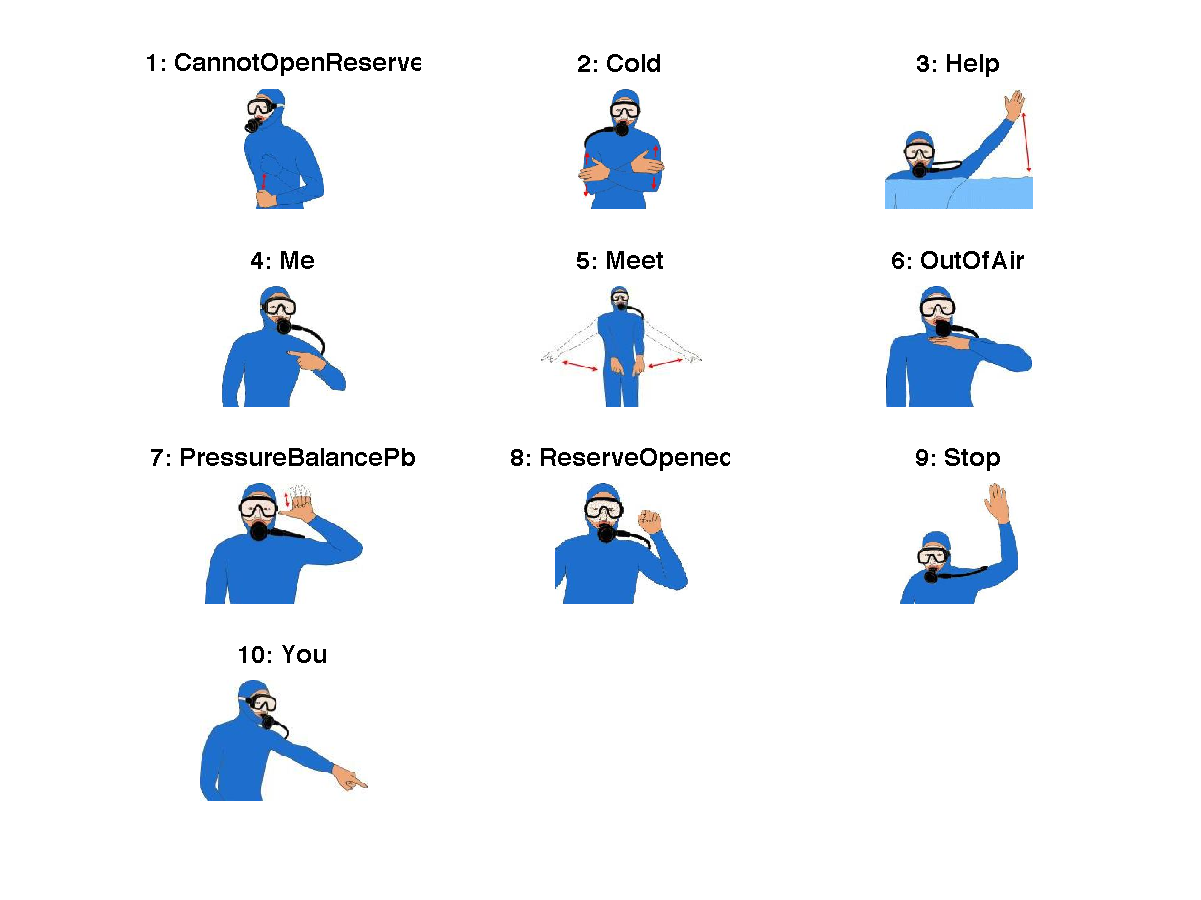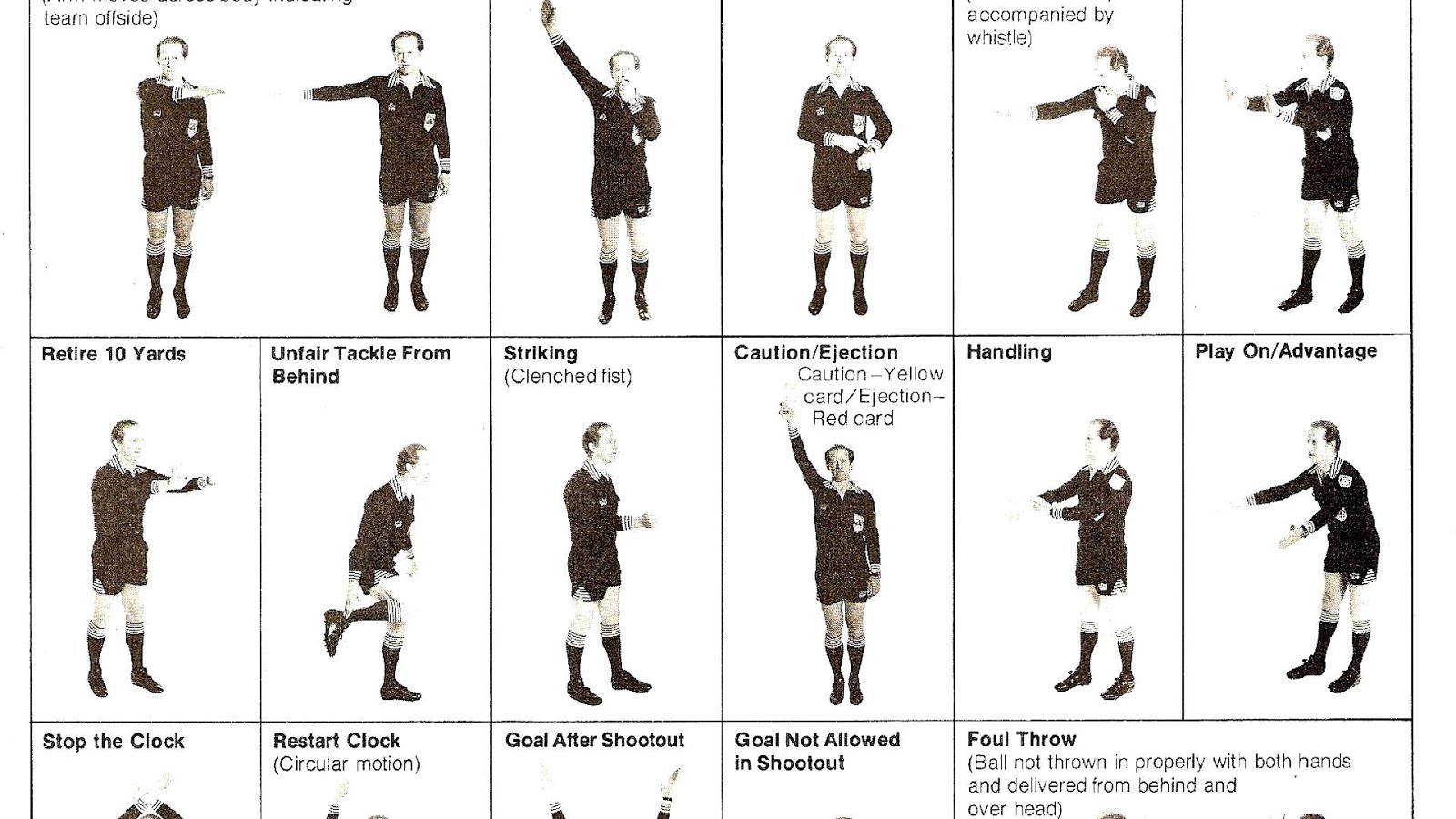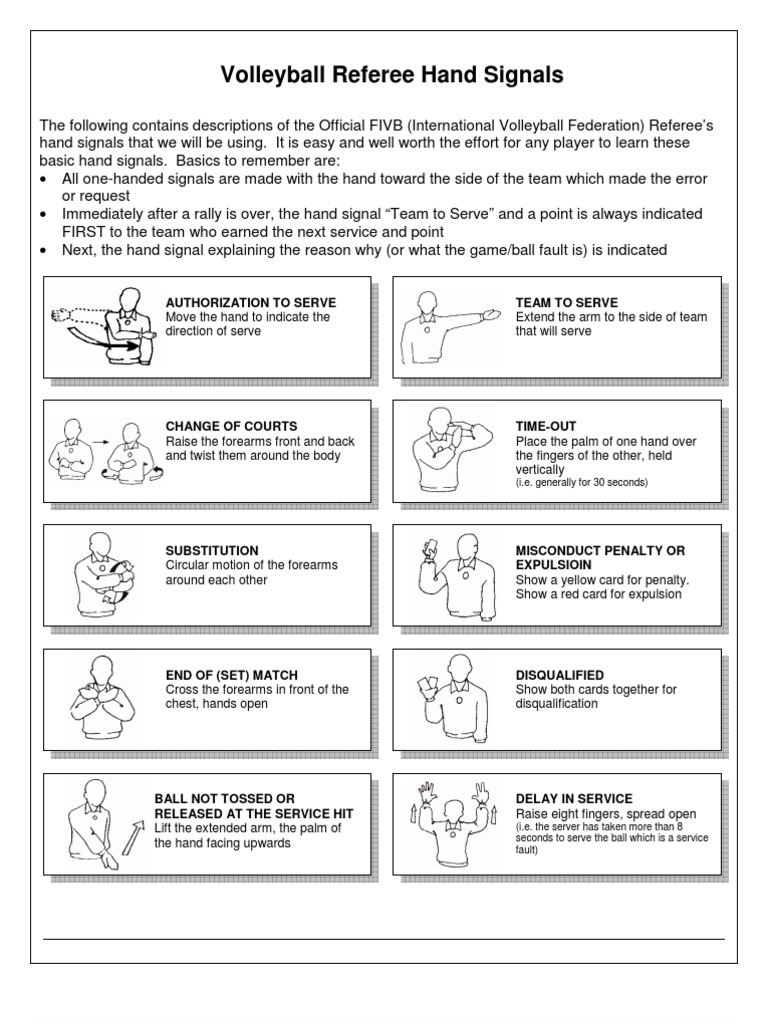Official Hand Signal Rules in volleyball. Good to know Volleyball training

NFHS Offical Volleyball Signals Volleyball rules, Volleyball referee, Volleyball tryouts
Brush with the palm of one hand the fingers of the other; held vertically; USAV: Brush fingers of opposite hand once over palm of vertical hand. Cover the wrist with a yellow card (warning) and with a red card (penalty). Lines: Point down with flag. Lines: Raise flag vertically. Lines: Raise flag and touch the top with the palm of the free hand.

Volleyball Umpiring Signals PDF
Common hand signals used by referees include a fist to indicate a personal foul, a fist and a point to indicate an unsportsmanlike conduct foul, a rotating motion to indicate a delay of game, a cross to indicate a technical foul, a T to indicate a time-out, and a hand pointed up to indicate the end of a period or game.

volleyball hand signals philippin news collections
In volleyball, referees use hand signals to communicate decisions. Key signals include point (1 arm raised), side out (both arms), and substitution (pointing). There are over 20 official signals for various rulings and game situations. Referee Hand Signals Cheat Sheet Here's a detailed cheat sheet of common volleyball referee hand signals:

Official Hand Signal Rules in volleyball. Good to know Volleyball training
Officials. Recent News. Upcoming Region Events. USAV Announces 2 New Divisions for GJNC 11-13. COLORADO SPRINGS, Colo. (Aug. 25, 2023) - USA Volleyball is excited to announce a new format for the 2024 Boys Junior National Championship. Read More. 5-7. Fri. January. Boy's Junior Invitational.

301 Moved Permanently
Volleyball hand signals are a communication system players, and coaches use during a match. The signals are made by holding up one or two hands to indicate a desired action or strategy. For example, when a coach wants a player to set the ball, they will hold up one hand with the palm facing the player.

Official HAND Signals Know the basic rules of volleyball OFFICIAL HAND SIGNALS Information
Save 2 Volleyball referees use a variety of hand signals to communicate with players and coaches on the court. Knowing what these signals mean can help you comply with the rules and avoid costly penalties. This blog post will take a closer look at some of the most common referee signals in volleyball.

Volleyball Ref Signals fyi Volleyball referee, Volleyball rules, Volleyball tryouts
What are the most common signals of volleyball referees? In this video, I'm going to show you the top ten signals of volleyball referees. This video is not o.

Volleyball Referee Hand Signals YouTube
Start at the thigh and end at the waist. Avoid making the signal look like the catch signal. Delay in Service When the server doesn't contact the ball within 8 seconds, raise both arms above your head. Use five digits on the right hand, and thumb and the first fingers on the left hand.

FIVBVolleyball Hand Signals 2017 2010PosterENv04 F 9 20 REACHING BEYOND THE NET END OF SET
Hand Signals Referees use several hand signals during a volleyball game. The referee blows the whistle to signal the start and end of each play. The hand signals are given by the referee who first signals the fault and then indicates which team has won the point.

Volleyball ref signals Work Pinterest Volleyball, Referee and Volleyball drills
The first referee hand signals in volleyball as he brings both forearms together in front of their chest, palms facing each other, and then makes a circular motion with their forearms around each other as if rotating a wheel. This visually represents the exchange of players.

OFFICIALS HAND SIGNALS
Image by: blogspot.com Volleyball hand signals are key in communicating with your teammates on the court. There are three main signals that are used: "Ready", "Set" and "Hit". The "Ready" signal is a fist held up to your chest and means that you are ready to receive the ball.

Volleyball Official Hand Signals Volley Choices
1. Illegal Alignment/ Improper Server 2. Line Violation 3. Illegal Hit 4. Delay of Service 5. Over-the-Net 6. Net Foul or Net Serve 7. Legal Back Row Attack 8. Illegal Attack of Serve/ Back Row Attack 9. Illegal Blocking or Screening 10. Ball Touched 11. Four Hits 12. Double Hit 13. Ball Lands In 14. Out of Bounds/ Antenna Violation

Volleyball referee signals polizbin
Referee Hand Signals Referees use a great number of hand signals during a volleyball game. The referee blows the whistle to signal the start and end of each play. The line judges can only signal if a ball was in, out, touched, or a foot fault occurred. The down referee can call touches, nets, under the nets, and rotational errors.

Volleyball Referee Hand Signals
new officials; mavo nfhs pay dues; new officials check list; nfhs only info; nfhs training materials; inquire about officiating; uniforms/equipment; coaches corner; important links; officials hand signals; arbiter; mavo bylaws; meetings/reports

Volleyball Officials Hand Signals TmDbt4 Clipart Kid
Referee Signaling For Blocking/Setting. In volleyball, the role of the referee is to ensure that the rules of play are followed and to signal any infractions. It's estimated that a referee signals between six and twelve hand signals per match! One such signal is for blocking or setting - an essential part of the game.

Volleyball Hand Signals Vertical Poster Volleyball Coach Etsy
NFHS OFFICIAL VOLLEYBALL SIGNALS. 13. Ball Lands Inbounds 14. Out-of-Bounds/ Antenna Violation 15. Begin Serve 16. Substitution 17. Authorization to Enter 18. Point 19. Replay/Re-serve 20A. Team 20B. Official 21. Unnecessary Delay 22. End-of-Set 23. Change of Courts NFHS OFFICIAL VOLLEYBALL SIGNALS 20. Time-out. liliilldli PlayPics courtesy of.